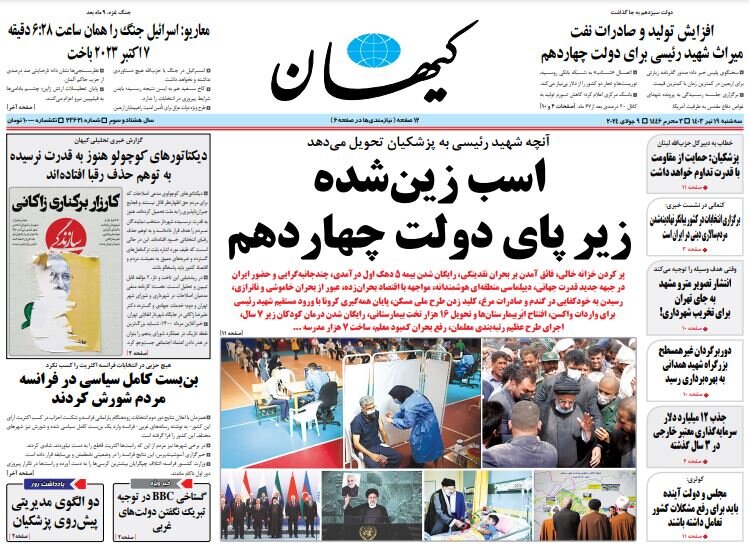The Western approach is duplicity

TEHRAN - In a note, Kayhan discussed the insult of the BBC Persian website and wrote: The BBC called Pezeshkian a puppet and said that when Hassan Rouhani became president with the promise of change, Germany, Italy and France, in addition to the European Union, congratulated him on his victory.
The electoral strategy of Pezeshkian was similar at the same time. However, the Western world did not react to this victory. The analysis suffused with the BBC's distortion is at a time when the post-JCPOA relations between Iran and the four Western governments came to a deadlock as a result of the West breaking the agreement. It was the United States that, after cheating and taking full concessions from the Rouhani government, resumed the process of increasing sanctions and then completely stopped the implementation of its commitments. Three European governments said they were willing to trade limited food and medicine in exchange for buying oil, but they did not keep that promise. The approach of the West shows that they do not see a difference between the governments and their political tastes in Iran or the level of optimism and pessimism of these governments towards the West, and their diplomacy is based on duplicity, extravagance, and disloyalty.
Siasat-e-Rooz: Enmity with Iran, America's grand strategy
The track record of the 13th government shows the enormous diplomatic capacity that has been created by relying on the multi-layered diplomacy of neighbors, regional, extra-regional, regional unions and international organizations and even the continuation of the process of negotiations with the United States. Therefore, the claim of Iran's global isolation, and the need for the 14th government to reconcile with the world is far from being a logical claim because if Iran was an isolated country without global interaction, this amount of congratulatory messages would not have been sent to the president-elect. The truth is that there is no difference between Biden and Trump and their enmity with Iran is derived from America's grand strategy. Imagining Washington's interactive approach is an unrealistic view that does not bring any results other than conditioning the economy and increasing the country's problems. The noteworthy point is that the right way is not to focus on the JCPOA and negotiate to cancel the sanctions, but to continue the path of the 13th government to neutralize the sanctions with internal capacity and active diplomacy with a global vision beyond a few Western countries.
Jam-e-Jam: America, an enmity with two masks
In an analysis, Jam-e-Jam discussed the enmity of the American Democratic and Republican parties with Iran. It wrote: Considering the holding of the 2024 presidential elections in the United States, a significant part of experts in the media was revolving around which thinking and approach in Tehran and Washington will push bilateral relations towards improvement or increasing tension. The 45-year history of Iran has shown that the American Democrats and Republicans have tactical differences in the confrontation with Iran, but their unchanging strategy is nothing but weakening and defeating the Iranian nation. Now, considering the beginning of a new era in the executive field of the country and coming to office of the 14th government, it is obvious that some inside and outside the country are trying to make predictions about the possibility of solving the issues between the two countries, and also about the possibility of the next president of the White House being a Democrat or a Republican. But as experience shows, there is no difference between any of them in confrontation and enmity with the Iranian nation.
Hamshahri: Moving towards the management of tensions
In a conversation with Amir Ali Abolfath, an expert on American issues, Hamshahri dealt with the possible developments in the relations between Iran and the United States. The paper said: Although the results of the presidential elections in Iran are known, the United States still insists on continuing its hostile approach towards Tehran. In Iran-U.S. relations, everything is not related to Iran. It is the United States that has sanctioned Iran and must decide whether it wants to "remove, suspend or intensify" the sanctions, an issue that will determine the course of the upcoming developments. It seems that both sides will move in the direction of managing tensions, an approach that will neither worsen the relationship nor reduce the problems between them. The important point here is that to speculate about the future of relations in this area, we must first wait for the establishment of the new government, both in Iran and in the United States. After the establishment of the government, the determination of the political-security team of the governments is also of special importance. It should be kept in mind that even if the Biden administration stays in power, changes in the political-security team of the White House are not unlikely.
Leave a Comment